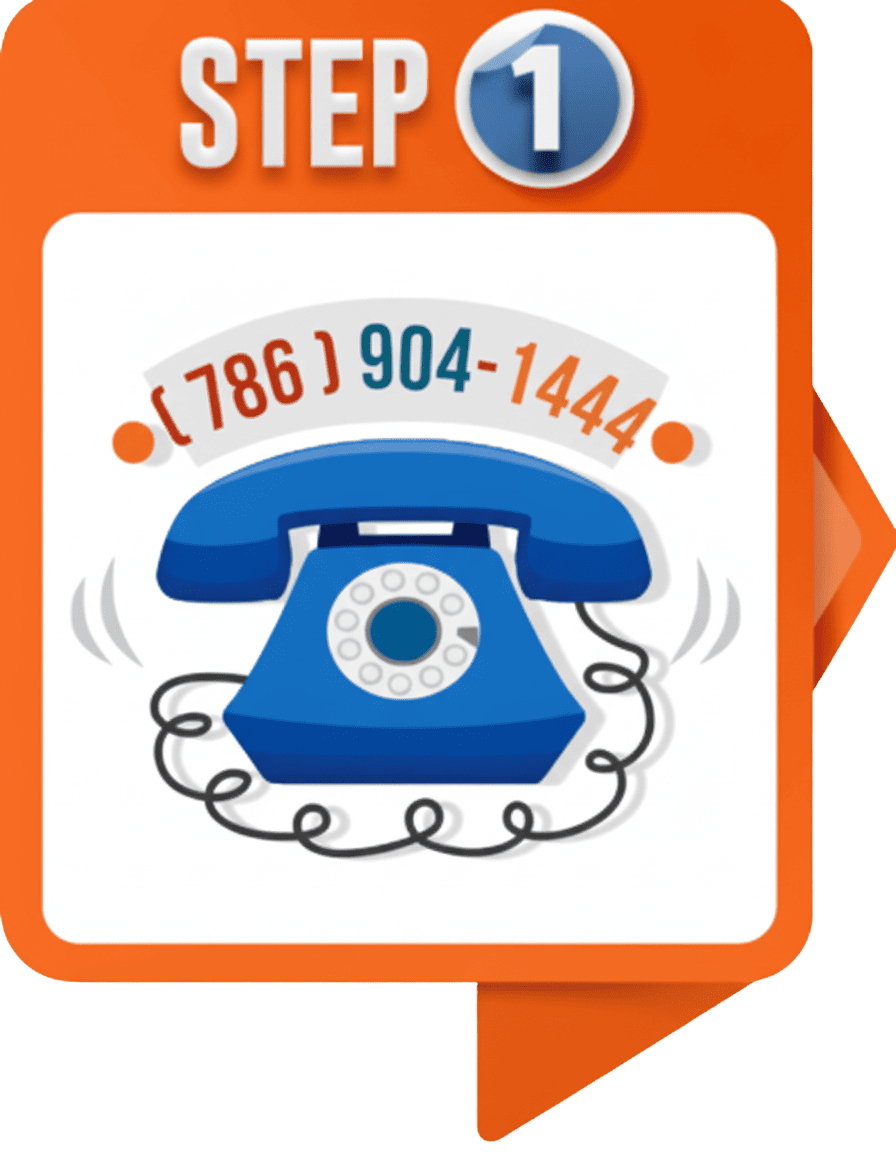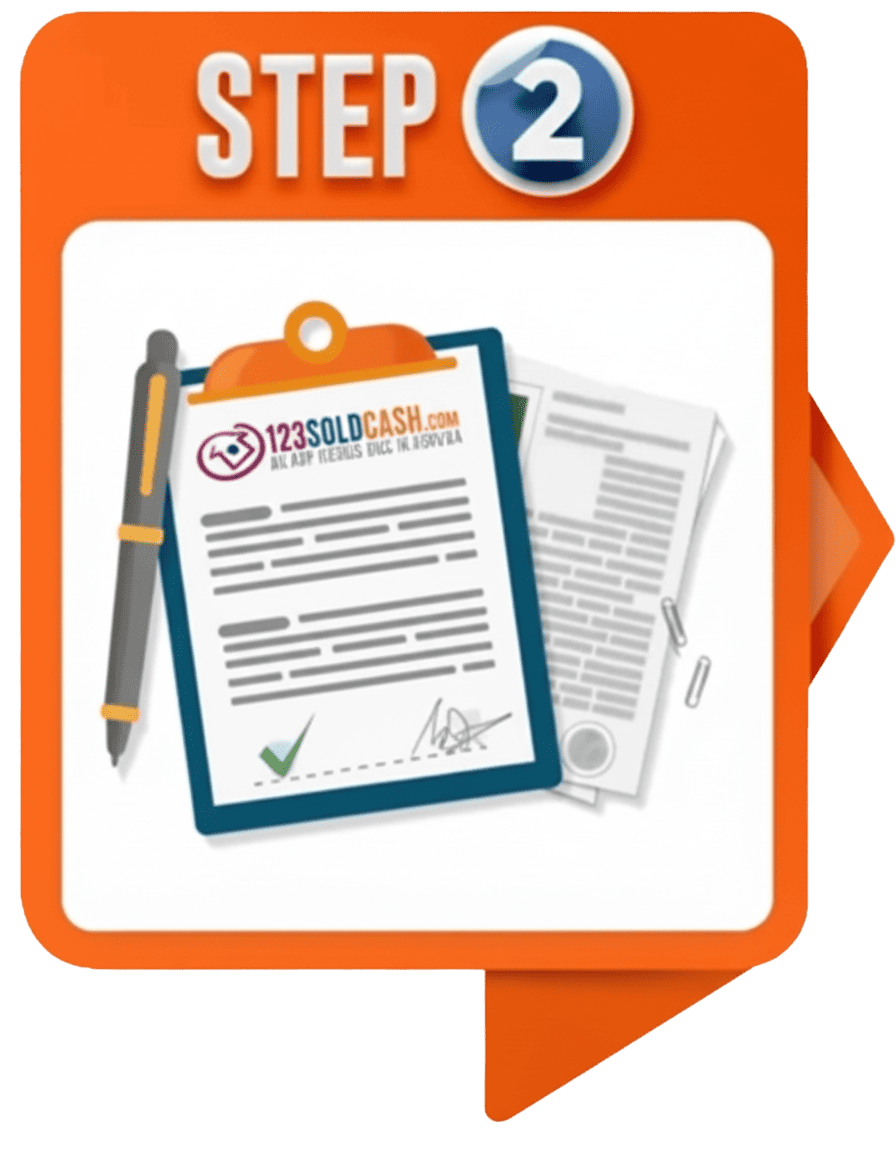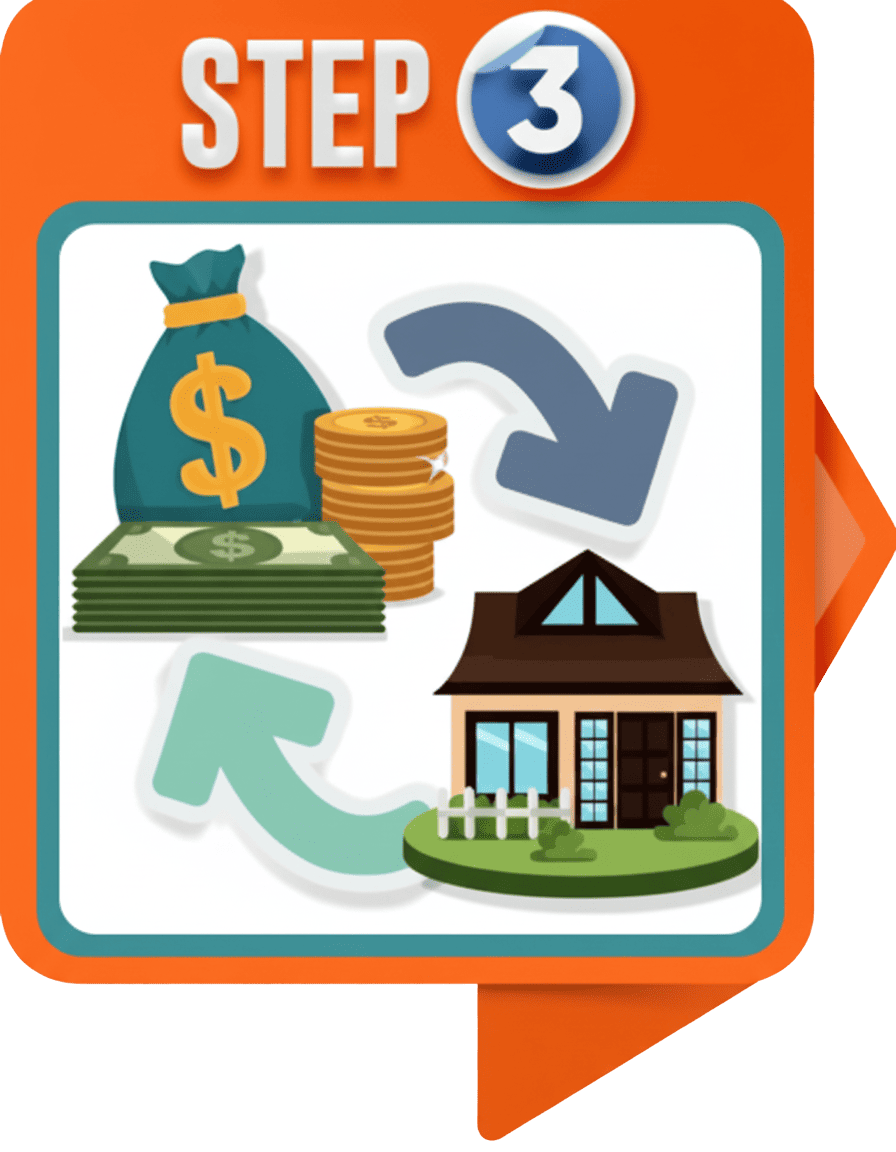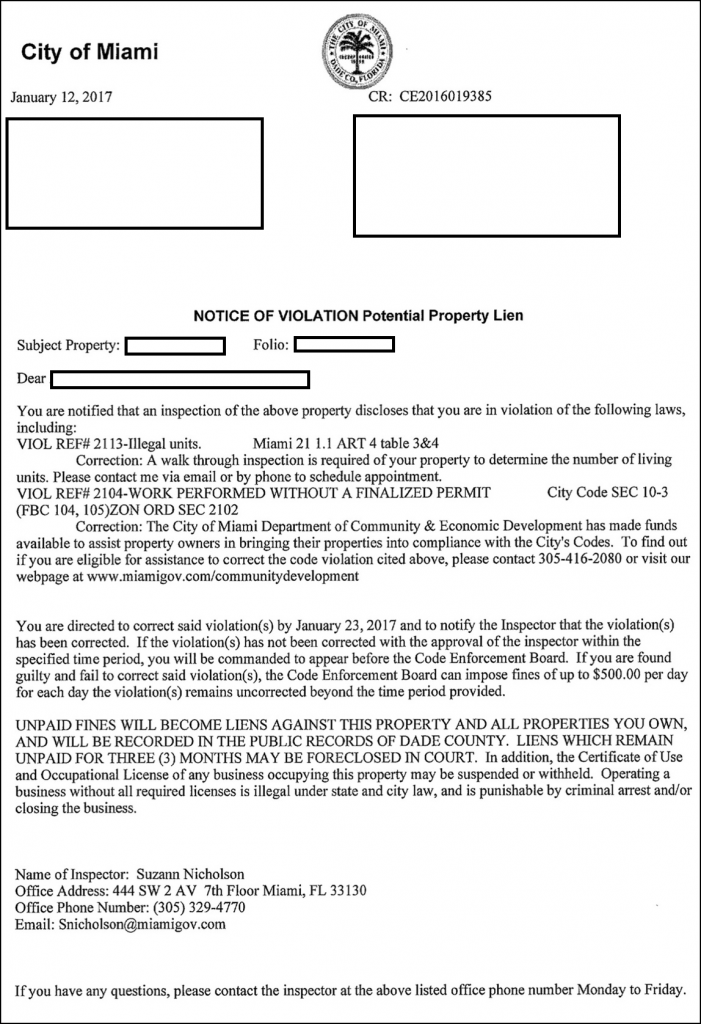Got Code Violations in Miami? We Buy Your House AS-IS!
Get My Miami Cash Offer Now!
Call/Text/WhatsApp Now: (786) 904-1444
100% FREE! Find Out How We Make Our Offers!
Dealing with Miami-Dade County code violations is overwhelming. You’reprobably stressed about mounting fines, expensive repairs, or the city taking legal action against your property. Here’s the good news:
You can sell your Miami house with code violations directly to us – no repairs, no hassle, no moresleepless nights.
✓ We buy Miami houses with ANY code violations – even withthousands in fines
✓ No repairs needed – we handle everything after we buy it
✓ Fast cash offers in 24 hours – close in 7-14 days
✓ 30+ years serving Miami-Dade County homeowners
Why Miami Code Violations Are Different.
Miami-Dade County has unique challenges that make code violationsespecially stressful for homeowners:
Hurricane Damage Violations:
After storms like Hurricane Irma andrecent tropical systems, many Miami homes have unrepaired damage thattriggers violations. Roof damage, broken windows, and structural issuesfrom wind and flooding are common.
Older Housing Stock:
Many Miami neighborhoods like Little Havana,Overtown, and parts of Coral Gables have homes built in the 1940s-1960sthat don’t meet current codes. Electrical, plumbing, and structural updatescan cost $50,000+.
Strict Miami-Dade Enforcement:
Miami-Dade County code enforcementis aggressive. They conduct regular sweeps through neighborhoods andissue violations quickly. Fines can reach $500+ per day for each violation.
Language Barriers:
Many Miami homeowners struggle with English-language violation notices and don’t understand their rights or options.
Common Miami Code Violations We Handle
| Hurricane Damage Roof damage, broken windows,structural issues from storms | Plumbing Issues Leaky pipes, unpermitted additions,sewer problems | Property Maintenance Overgrown yards, debris, exteriordeterioration |
| Electrical Problems Outdated wiring, missing permits,unsafe electrical work | Structural Problems Foundation issues, unpermittedadditions, unsafe structures | Zoning Violations Illegal rentals, unpermittedconversions, business use |
“I inherited my grandmother’s house in Little Havana with $15,000 incode violation fines. The electrical was from the 1950s and the roofleaked every time it rained. I couldn’t afford the repairs and the fines keptgrowing. 123SoldCash bought it as-is and I walked away with cashinstead of debt. They handled everything with the city.”
Latoya M, Homestead.

After Hurricane Irma damaged my Homestead property, I got hit withmultiple violations. The city wanted $40,000 in repairs and I owed more than 100K in fines. I’m 72 years old and couldn’t handle the stress. These guys bought my house in 33 days and I moved to a nice apartment. Bestdecision I ever made.”
Carl A, LittleHavana

We Buy ALL Types of Properties in USA

USA Home Purchase: Just 3 Steps
Selling your house is simple and stress-free with our proven process. If you’re wondering how to sell my house fast, our quick and easy steps make it possible.

Request a Cash Offer
Reach out by filling out our short form or giving us a call. We’ll gather details about your USA property and prepare a competitive buy house cash offer.

Receive Your Offer
We’ll review your information and quickly provide a fair, no-obligation cash offer. There’s no pressure you decide if it works for you.

Close and Get Paid
Once you accept the offer, we buy houses fast and close at a local title company. You’ll get cash in hand on the closing date you choose.
Get An Offer Today, Sell In A Matter Of Days...
"*" indicates required fields
How We Handle Miami-Dade County Violations
| Step 1: We Research Your Violations We check Miami-Dade County records, understand exactly what violations youhave, and calculate the total cost to fix everything. You don’t have to figure thisout alone. ✓ We know Miami-Dade County code enforcementprocedures ✓ We understand which violations are serious vs. minor ✓ We calculate realistic repair costs (not inflated contractorestimates) |
| Step 2: Fair Cash Offer in 24 Hours We make you a written offer based on your home’s value minus repair costsand violation fines. No surprises, no hidden fees, no games. ✓ Fair market value minus actual repair costs ✓ We factor in all fines and penalties ✓ Written offer you can review with family |
| Step 3: Fast Closing (Your Choice) Pick your closing date – usually 7-14 days. We handle all paperwork and dealwith Miami-Dade County after closing. You get cash and walk away stress-free. ✓ Close in 7-14 days (or longer if you need time) ✓ We handle all Miami-Dade County paperwork ✓ You get cash at closing – no waiting |
Miami Neighborhoods We Serve
We buy houses with code violations throughout Miami-Dade County:
Miami:
Downtown, Brickell, Little Havana, Opa-Locak, Wynwood, Design District, Coconut Grove, Coral Gables, South Beach, Miami Beach
South Miami-Dade:
Homestead, Florida City, Cutler Bay, Palmetto Bay,Pinecrest
West Miami-Dade:
Doral, Sweetwater, Westchester, Fontainebleau,Tamiami
North Miami-Dade:
North Miami, North Miami Beach, Miami Gardens, Aventura, SunnyIsles Beach, Bal Harbour
Why Choose 123SoldCash for Your MiamiCode Violation House?
- A+ Better Business Bureau Rating – Trusted in Miami for30+ years
- We speak Spanish – Hablamos Español for Miami’s Hispanic community
- We speak Portuguese – Falamos português na comunidade brasileira
- We are Local company – We understand Miami-Dade County procedures
- No realtor commissions – You keep more money
- No repairs needed – We buy AS-IS condition
- Fast closings – Cash in your hand in days, not months
Falamos Portugues na Comunidade Brasileira,
| Frequently Asked Questions – Miami CodeViolations |
|---|
| Do you work with Spanish-speaking homeowners? |
| ¡Sí! Hablamos Español. Many of our Miami team members are bilingual. Wecan explain everything in Spanish and help you understand your options. |
| Can I really sell my Miami house with open codeviolations? |
| Yes! In Florida, you can legally sell a house with code violations. You just needto disclose them to buyers. We specialize in buying these houses AS-IS, evenwith active Miami-Dade County enforcement cases. |
| What if I owe thousands in fines to Miami-Dade County? |
| We can often work with you even if you owe substantial fines. We factor thesecosts into our offer and handle the resolution process with Miami-Dade Countyafter closing. |
| Will you buy my house if it has hurricane damageviolations? |
| Absolutely! Hurricane damage is common in Miami. We’ve bought hundredsof storm-damaged properties with code violations. We understand the uniquechallenges Miami homeowners face after hurricanes |
| How much will you pay for my Miami house withviolations? |
| We pay fair market value minus the cost of repairs and dealing with violations.You get a written offer with no surprises or hidden fees. Most Miamihomeowners are pleasantly surprised by our offers. |
⏰ DON’T WAIT – MIAMI CODE VIOLATION FINES INCREASEEVERY DAY! ⏰
Get Your Miami Cash Offer Today!
Stop worrying about Miami-Dade County code violations. Stop losingsleep over mounting fines. Stop stressing about expensive repairs you can’t afford.
We’ll buy your Miami house AS-IS. with any violations, in any condition, withany amount of fines owed.
✓ Call now for immediate help: (786) 904-1444
✓ Or fill out our simple form for a cash offer in 24 hours
Fill In The Form For Your FREE, All-Cash Offer!
Your information is confidential. We never sell user data.

“I cannot say enough about Chris and the team. Look no further! They got everything lined up smoothly and quickly from the beginning to the end. Took them just a few days to get us the cash for the house. I will definitely recommend to call Chris. God blessed you and your family.”
~ Daniel Jackson Fort Lauderdale, FL 

Sell Your House WITH CODE VIOLATION In Miami And Pay No Agent Fees, And No Repairs.
Selling a Miami property with code violations can be daunting, but with a proactive approach, you can sell for a fair price. If you have an open code enforcement case, you may have questions – we can answer.
Here are some questions you have :
Discover how to sell a Miami property with code violations research, learn, sell “as-is” or remediate, find a buyer, and close. We can help you make your sale successful, even with an open code enforcement case.
Research The Miami Property
Discover how to sell a Miami property with code violations in just 5 steps: research, learn, sell “as-is” or remediate, find a buyer, and close. We can help you make your sale successful, even with an open code enforcement case.
Why Researching the Miami Property is Important?
When you decide to sell a house, it’s essential to have an accurate understanding of the property’s legal specifications. It helps you price the property correctly, understand what needs to be done before the sale, and give buyers an accurate picture of what they’re buying.
Moreover, if your property has code violations, researching it can help you understand the extent of the problem and what needs to be done to resolve it. This information is crucial as code violations can cause legal complications and impact the sale of your property.
Miami Dade County Property Search
The Miami-Dade County Property Search is a great resource for researching Miami property. The website provides comprehensive information on the property’s specifications, including the property’s legal description, ownership history, assessed value, and tax information.
To access this information, you need to search for your property on the Miami-Dade County Property Appraiser website. Once you’ve found your property, you can view its specifications by clicking on the “Property Details” tab.
Evaluating Offers
Understanding how buyers think is an essential part of selling a house. Researching the Miami property helps you find the site Realtor.com to evaluate offers by providing you with a better understanding of the property’s value.
Buyers typically use the Miami-Dade County Property Appraiser website when calculating their offer. Zillow.com can help you do that. By understanding the specifics of your property, you can make an “apples to apples” comparison to active and sold comps. This helps you price your property accurately and evaluate offers better.
Unpermitted Features
One thing you should look out for when researching your property is unpermitted features. These are features that were added without the proper permits, such as a bedroom/bathroom, extension, pool, or patio and are not reflected in the public record.
This can be particularly concerning if code enforcement is already inspecting the house due to an existing violation. Unpermitted features can cause legal complications and impact the sale of your property.
Directions for Researching the Miami Property
To research the Miami property, follow these directions:
- Go to the Miami-Dade County Property Appraiser website.
- Search for your property using the property address or the owner’s name.
- Once you’ve found your property, click on the “Property Details” tab.
- Review the property’s legal description, ownership history, assessed value, and tax information.
By following these directions, you can get a comprehensive understanding of the legal specifications of your property.
What is the Miami-Dade County Property Search?
The Miami-Dade County Property Search is a website that provides comprehensive information on the legal specifications of properties in Miami, including the property’s legal description, ownership history, assessed value, and tax information.
Why is researching the Miami property important?
Researching the Miami property is important because it helps you price the property correctly, understand what needs to be done before the sale, and give buyers an accurate picture of what they’re buying. It also helps you identify potential legal complications.
Researching the Miami property is an essential first step in the process of selling a house with code violations. It helps you understand the legal specifications of the property, evaluate offers better, and identify potential legal complications such as unpermitted features. By following the directions provided in this article, you can easily research your property and make informed decisions.

Learn About The Code Violation
If you have received a notice of violation for your property in Miami, it is important to gather all the necessary information about the violation from local code enforcement. In this article, we will provide you with a step-by-step guide on how to learn about the code violation and make informed decisions about how to remediate it.
Gather all the necessary information.
To make the best decision possible, you need to know all the details about the code violation impacting your property. This includes the violation number and name, the type of violation, the date it was issued, the inspector that found the violation, ongoing penalties for non-compliance, and the steps required to remediate the violation. You should have received a notice of violation (either in the mail or posted on your door) that contains some of this information.
Contact the code enforcement department.
While the notice of violation is helpful, it rarely addresses how to remediate the violation. Therefore, we recommend contacting Miami’s code enforcement department directly to get more information. You can do this by visiting the Code Compliance Division or Construction Services and Building websites or by calling (305) 416-2087.
E-mail: codeenforcement@miamigov.com
Website: Code Compliance Department
Website: Building & Permitting Department
Address: 444 SW 2 Ave, 7th Floor, Miami, FL 33130
Telephone: (305) 416-2087

Check the public I-Frame system
You can also check Miami’s public I-Frame system for information on violations or expired permits. This will provide you with additional details about the violation and help you understand what steps are required to remediate it.
Questions to ask code enforcement
When you connect with code enforcement, here are some questions you should ask:
- What will be the penalty if the code violation isn’t corrected?
- What must be done to remediate the violation?
- If the violation is corrected, what is the process for re-inspecting and closing the code enforcement case?
- Is there any other information you can tell me about the violation?
Learning about the code violation impacting your property in Miami is an important step in the process of remediation. By gathering all the necessary information and contacting code enforcement, you can make informed decisions about how to address the violation and avoid further penalties.
123SoldCash Team: Common Code Violations
Our company has purchased houses with violations. Check out this list of violations that we’ve encountered that you should consider when you’re selling a property.
| Overgrown Grass and Vegetation | Mold and Mildew | Unsafe Structures |
| Disabled and Inoperable Vehicles | Exterior Wall in Disrepair | Work Done Without Permits |
| Debris and Junk | Defective Plumbing | Asbestos or Lead Testing |
| Illegal Signage | Defective Electrical | Bedrooms Without Windows |
| Obstruction of Views | Non-Conforming Use (Zoning) | Improper Bathroom Venting |
Sell “As-Is” or Remediate The Violation On Your Own?
If you own a property in Miami with a code violation and are looking to sell, you may be wondering whether to sell the property “as-is” or remediate the violation on your own first. In this article, we will explore the benefits of both approaches to help you make an informed decision.
Benefits of selling “as-is”
Selling a property “as-is” means that you are selling the property in its current condition, with no repairs or renovations made to remediate the violation. There `are several benefits to selling “as-is,” including:
- Faster sale: Selling “as-is” can often lead to a faster sale, as buyers who are willing to take on a property with a code violation may be more likely to make an offer.
- Lower costs: By not making repairs or renovations to remediate the violation, you can save money on the cost of those repairs.
- No liability: Once you sell the property “as-is,” you are no longer liable for any issues related to the code violation.
Benefits of remediation
Remediating the violation on your own before selling the property can also have several benefits, including:
- Higher sale price: By remedying the violation, you can increase the value of the property and potentially sell it for a higher price.
- Better marketability: A property with no code violations is often more marketable and attractive to potential buyers.
- Avoid future issues: By addressing the violation, you can avoid potential issues that may arise in the future, such as fines or penalties for non-compliance.
Making the decision
Deciding whether to sell “as-is” or remediate the violation on your own is a personal decision that depends on several factors, including the severity of the violation, your budget, and your timeline for selling the property. It is important to weigh the benefits of both approaches and make an informed decision based on your specific situation.
Deciding whether to sell a property “as-is” or remediate the violation on your own is a personal decision that requires careful consideration of several factors. By weighing the benefits of both approaches and making an informed decision, you can sell your property with confidence and avoid potential issues down the line.
Select A Buyer
Choosing the right buyer is crucial when it comes to selling your house in Miami, especially when there is a violation involved. Here are some key factors to consider before selecting a buyer:
Vet the Buyer’s Qualifications
Make sure to thoroughly evaluate the buyer’s qualifications before accepting an offer. A high offer is not the only important factor to consider. It is essential to review the terms of the offer, as well as the buyer’s financial and professional background.
Pay Attention to Contract Terms
When evaluating offers, it is important to pay attention to the contract terms. The following are some key factors to consider:
- Escrow Deposit: This is a sum of money paid by the buyer to demonstrate their interest in completing the transaction. It is typically several percentage points of the offer price and is held by a neutral attorney or broker.
- Inspection Period: This is the period of time for the buyer to inspect the premises and cancel the contract due to any issues found at the property.
- Closing Date: Make sure to schedule the closing in the near future, especially if there are ongoing fines or an upcoming auction.
- Financing Contingency: This allows a buyer to back out at the last minute if they are unable to raise the money to complete the sale.
Consider Experience Rehabbing Property
It is important to consider if the buyer has experience rehabbing the property, especially if the house has a violation. Check if they have purchased a “fixer-upper” before and if they have a history with such properties.
Verify Cash Proof of Funds
Anyone can write an offer amount in a contract, but it does not mean they can get the money to you. Ask for a bank statement or proof of funds showing the cash.
Check Testimonials and Reviews
Check if the buyer has online testimonials and social media reviews. Past experiences can be the best predictor of future outcomes.
BBB Accreditation
Better Business Bureau accreditation is a significant factor to consider when selecting a buyer. The BBB reviews the company’s online and corporate history before approving, making it the gold standard for a company willing to put its reputation on the line.
By carefully considering these factors, you can find a reliable buyer for your house in Miami, whether you decide to sell “as-is” or remediate the violation on your own.
The “For Sale By Owner” (FSBO) approach
In this approach, owners choose to sell without the help of a realtor and avoid the traditional process of listing the house on the Multiple Listing Service (MLS). The main benefits of an FSBO sale are the potential savings on realtor commissions, greater control over the sale process, and the possibility of a faster sale. However, there are also downsides to consider, such as less public exposure and a potentially smaller pool of interested buyers.
Close on the Property
Selling a house with a code violation is a stressful process, but closing on the property is the final step to completing the sale. In this step, the seller receives the cash, and the ownership of the property is transferred to the buyer. Here’s what you need to know about closing a house with a violation.
Closing Walkthrough
Before the closing, the buyer is entitled to one last inspection of the property to ensure that it’s in the same condition as when they entered the contract to purchase it. This inspection protects the buyer from any last-minute issues that may have occurred since the initial inspection.
HUD-1 Statement
The HUD-1 Settlement Statement is a standard government form used by closing agents to list all charges and monetary transfers at closing. A draft of this statement is usually circulated prior to the closing documents being signed. It’s essential to review the draft HUD statement to understand what transfers will be made at closing.
Clean-Out
Sellers are typically expected to remove all “personal property” from the property before closing unless negotiated otherwise. While small items are generally not a big deal, larger items, such as inoperable vehicles, boats, or furniture, may be costly to remove. It’s important to discuss with the buyer what will remain on the property and what will be removed before closing.
Closing on a house with a code violation can be overwhelming, but knowing what to expect can ease some of the stress. By following these tips, you can ensure that the closing process goes smoothly and that you receive the cash you’re owed. Remember, this is the final step in the selling process – you’re almost there!
Get An Offer Today, Sell In A Matter Of Days…
"*" indicates required fields
If So Many Happy Online Reviews –
We Must Be Doing Something Right



Get An Offer Today, Sell In A Matter Of Days…
"*" indicates required fields
Disclaimer: The information on 123SoldCash.com is provided for educational and informational purposes only. While we work hard to keep our content accurate and up-to-date, we cannot guarantee its completeness or reliability. This content is not intended as legal or financial advice and should not replace consultation with qualified professionals. For specific legal or financial questions, please consult with an attorney or CPA.


